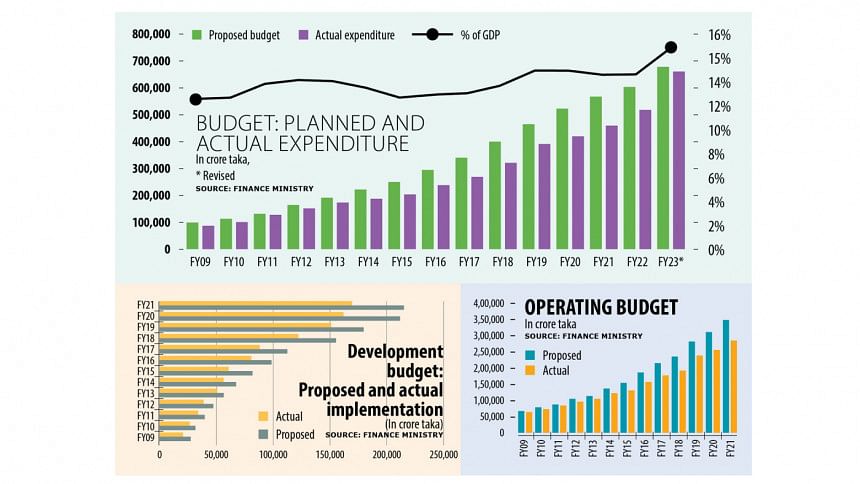Budget stuck in vicious cycle of non-implementation

The government is likely to fail to implement its national budget fully in the ongoing fiscal year owing to policymakers' over-optimism and a lack of capacity of public agencies.
If the current pace of execution continues in the remaining days of 2022-23, which ends on June 30, it would be the 14th consecutive year that the government would fail to implement the budget.
"Of course, it is a vicious cycle," said AB Mirza Azizul Islam, a former finance adviser to a caretaker government.
"Every year, we allocate funds but we can't utilise the entire amount. As a result, Bangladesh is deprived of the benefit it could have reaped from the full implementation of the budget."
For 2022-23, the government has lowered its overall expenditure plan to Tk 6.60 lakh crore. The revised amount is 97 per cent of the planned outlay of Tk 6.78 lakh crore set at the start of the fiscal year.
If the revised target is attained, it would equal the highest rate of implementation registered in 2011. Bangladesh's average budget implementation rate was 86 per cent since 2008-09, according to the finance ministry.
Islam, who placed budgets for 2007-08 and 2008-09, said the main reason behind the failure to implement the planned budget is the incompetence of public officials and lack of accountability.
"You will have to introduce a system of accountability. There should be a provision for reward for success and punishment for failure."
Mustafa K Mujeri, executive director of the Institute of Inclusive Finance and Development, describes the budget-framing process as highly political.
"And the reality is that we see over-optimism in making expenditure plans as the budget looks to accommodate the demands of all sections of society although we know it will not be implemented. Those who are involved in making the projections are aware that the targets will not be attained. Yet, they keep setting higher targets."
"Our implementation capacity is not improving. But we do not pay attention to ensure proper execution."
The former director-general of the Bangladesh Institute of Development Studies said because of a lack of full implementation, it has been difficult to keep priorities.
"A higher amount of money is being spent on building hard infrastructure such as roads and highways, while the expenditure for soft infrastructure such as education, health and social protection is not expanding to that extent. We are falling behind in these important areas."
Finance ministry data showed that the average implementation rate of development projects was 81 per cent in the 13 years to 2020-21. In the case of operating expenditures such as salaries for public officials and interest on loans, the execution rate was 88 per cent between 2008-09 and 2020-21.
"It is okay if the budget is not implemented in one or two years. But it can't go on year after year. It means that there are some problems. It is necessary to identify them and sort them out," Mujeri said.
Fahmida Khatun, executive director of the Centre for Policy Dialogue, says the budget is stuck in the vicious cycle of non-implementation.
"It is a matter of sorrow although there is nothing to be surprised. It has become business as usual."
She said the factors behind the implementation failure are not discussed in parliament.
According to Fahmida, ensuring development expenditure is necessary as it will give a boost to economic activities, attract investment, create jobs, and raise incomes.
"The quality of life will improve if fiscal measures are executed properly. Then, we will see a lot of positive effects."

 For all latest news, follow The Daily Star's Google News channel.
For all latest news, follow The Daily Star's Google News channel. 








Comments